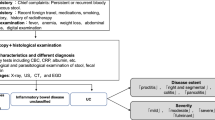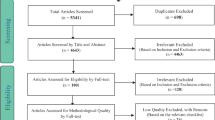Abstract
Purpose
Inflammatory bowel disease (IBD) patients experience diverse symptoms and the impact of these different symptoms varies substantially. Current disease activity measures do not account for the relative importance of the different symptoms and severity levels. In this study, we aimed to quantify the relative importance of different symptoms for IBD patients and to develop a patient preference-weighted symptom (PWS) score to assess symptom burden in IBD.
Methods
We performed a choice-based conjoint analysis (CBCA) survey with 129 IBD patients to estimate the relative importance of four common IBD symptoms: stool frequency, abdominal pain, blood in stools, and urgency. We then developed the PWS score using the preferences obtained from the CBCA, which we validated against existing measures.
Results
CBCA revealed that urgency was the most important symptom to patients, followed by abdominal pain and blood in stools. Urgency associated with incontinence received particularly high scores and was perceived to be more than 3 times as important as urgency without incontinence. Our results confirmed that different symptoms are not equally bothersome, and we showed that the relation between symptom-level and importance is not linear. The PWS score, which we developed using these estimates was highly correlated with existing disease activity measures.
Conclusions
We quantified the relative importance of four common IBD symptoms and developed the PWS score for IBD, which takes the relative importance of different symptoms and symptom-levels into account. The PWS score can be used to obtain a patient-centered assessment of symptom burden.



Similar content being viewed by others
Availability of data and material
Upon request from the corresponding author.
Code availability
Sawtooth Software (Provo, UT) was used for survey design, survey hosting, and hierarchical Bayes modeling. Statistical tests were performed using SAS 9.4 (Cary, NC). SAS code is available upon request from the corresponding author.
References
Farrell, D., McCarthy, G., & Savage, E. (2016). Self-reported Symptom Burden in Individuals with Inflammatory Bowel Disease. Journal of Crohns Colitis, 10(3), 315–322. https://doi.org/10.1093/ecco-jcc/jjv218.
Best, W. R., Becktel, J. M., Singleton, J. W., & Kern, F., Jr. (1976). Development of a Crohn's disease activity index. National Cooperative Crohn's Disease Study. Gastroenterology, 70(3), 439–444.
Harvey, R., & Bradshaw, J. (1980). A simple index of Crohn's-disease activity. The Lancet, 315(8167), 514.
Lewis, J. D., Chuai, S., Nessel, L., Lichtenstein, G. R., Aberra, F. N., & Ellenberg, J. H. (2008). Use of the noninvasive components of the Mayo score to assess clinical response in ulcerative colitis. Inflammatory Bowel Diseases, 14(12), 1660–1666. https://doi.org/10.1002/ibd.20520.
Walmsley, R. S., Ayres, R. C., Pounder, R. E., & Allan, R. N. (1998). A simple clinical colitis activity index. Gut, 43(1), 29–32.
Falvey, J. D., Hoskin, T., Meijer, B., Ashcroft, A., Walmsley, R., Day, A. S., et al. (2015). Disease activity assessment in IBD: Clinical indices and biomarkers fail to predict endoscopic remission. Inflammatory Bowel Diseases, 21(4), 824–831. https://doi.org/10.1097/MIB.0000000000000341.
Khanna, R., Zou, G., D'Haens, G., Feagan, B. G., Sandborn, W. J., Vandervoort, M. K., et al. (2015). A retrospective analysis: The development of patient reported outcome measures for the assessment of Crohn's disease activity. Alimentary Pharmacology & Therapeutics, 41(1), 77–86. https://doi.org/10.1111/apt.13001.
Jairath, V., Khanna, R., Zou, G. Y., Stitt, L., Mosli, M., Vandervoort, M. K., et al. (2015). Development of interim patient-reported outcome measures for the assessment of ulcerative colitis disease activity in clinical trials. Alimentary Pharmacology & Therapeutics, 42(10), 1200–1210. https://doi.org/10.1111/apt.13408.
Spiegel, B. M., Hays, R. D., Bolus, R., Melmed, G. Y., Chang, L., Whitman, C., et al. (2014). Development of the NIH Patient-Reported Outcomes Measurement Information System (PROMIS) gastrointestinal symptom scales. American Journal of Gastroenterology, 109(11), 1804–1814. https://doi.org/10.1038/ajg.2014.237.
Kochar, B., Martin, C. F., Kappelman, M. D., Spiegel, B. M., Chen, W., Sandler, R. S., et al. (2018). Evaluation of Gastrointestinal Patient Reported Outcomes Measurement Information System (GI-PROMIS) symptom scales in subjects with inflammatory Bowel diseases. American Journal of Gastroenterology, 113(1), 72–79. https://doi.org/10.1038/ajg.2017.240.
Craig, B. M., Reeve, B. B., Brown, P. M., Cella, D., Hays, R. D., Lipscomb, J., et al. (2014). US valuation of health outcomes measured using the PROMIS-29. Value Health, 17(8), 846–853. https://doi.org/10.1016/j.jval.2014.09.005.
Devlin, N. J., Shah, K. K., Feng, Y., Mulhern, B., & van Hout, B. (2018). Valuing health-related quality of life: An EQ-5D-5L value set for England. Health Economics, 27(1), 7–22. https://doi.org/10.1002/hec.3564.
Mohamed, A. F., Hauber, A. B., Johnson, F. R., & Coon, C. D. (2010). Patient preferences and linear scoring rules for patient-reported outcomes. The Patient: Patient-Centered Outcomes Research, 3(4), 217–227.
Alrubaiy, L., Rikaby, I., Sageer, M., Hutchings, H. A., & Williams, J. G. (2015). Systematic review of the clinical disease severity indices for inflammatory bowel disease. Inflammatory Bowel Diseases, 21(10), 2460–2466. https://doi.org/10.1097/MIB.0000000000000438.
Bridges, J. F., Hauber, A. B., Marshall, D., Lloyd, A., Prosser, L. A., Regier, D. A., et al. (2011). Conjoint analysis applications in health—A checklist: A report of the ISPOR Good Research Practices for Conjoint Analysis Task Force. Value Health, 14(4), 403–413. https://doi.org/10.1016/j.jval.2010.11.013.
Ryan, M., & Farrar, S. (2000). Using conjoint analysis to elicit preferences for health care. BMJ, 320(7248), 1530–1533.
Walsh, A. J., Bryant, R. V., & Travis, S. P. (2016). Current best practice for disease activity assessment in IBD. Nature Reviews Gastroenterology & Hepatology, 13(10), 567.
The CBC System for Choice-Based Conjoint Analysis. Version 9 (2017). Sawtooth Software Technical Paper Series.
Sawtooth Software, CBC/HB v5, Software for Hierarchical Bayes Estimation for CBC Data. Manual. Retrieved July 23, 2020, from https://www.sawtoothsoftware.com/download/techpap/CBCHB_Manual.pdf.
Hauber, A. B., Gonzalez, J. M., Groothuis-Oudshoorn, C. G., Prior, T., Marshall, D. A., Cunningham, C., et al. (2016). Statistical methods for the analysis of discrete choice experiments: A Report of the ISPOR Conjoint Analysis Good Research Practices Task Force. Value Health, 19(4), 300–315. https://doi.org/10.1016/j.jval.2016.04.004.
Orme, B., & Johnson, R. (2014). Including holdout choice tasks in conjoint studies. Sawtooth Software, Inc. Retrieved July 23, 2020. from https://www.sawtoothsoftware.com/support/technical-papers/general-conjoint-analysis/including-holdout-choice-tasks-in-conjoint-studies-2014.
Chrzan, K., Zepp, J., & White, J. (2010). The success of choice-based conjoint designs among respondents making lexicographic choices. In 2010 Sawtooth Software Conference Proceedings (pp. 19–35). Newport Beach, CA.
Lancsar, E., & Louviere, J. (2006). Deleting ‘irrational’responses from discrete choice experiments: A case of investigating or imposing preferences? Health Economics, 15(8), 797–811.
Hess, S., Rose, J. M., & Polak, J. (2010). Non-trading, lexicographic and inconsistent behaviour in stated choice data. Transportation Research Part D: Transport and Environment, 15(7), 405–417.
Evertsz, F. B., Hoeks, C. C., Nieuwkerk, P. T., Stokkers, P. C., Ponsioen, C. Y., Bockting, C. L., et al. (2013). Development of the patient harvey bradshaw index and a comparison with a clinician-based Harvey Bradshaw index assessment of Crohn's disease activity. Journal of Clinical Gastroenterology, 47(10), 850–856. https://doi.org/10.1097/MCG.0b013e31828b2196.
Orme, B. (2010). Getting started with conjoint analysis: Strategies for product design and pricing research (2nd ed.). Madison, WS: Research Publishers LLC.
Brazier, J. E., & Roberts, J. (2004). The estimation of a preference-based measure of health from the SF-12. Medical Care, 42(9), 851–859.
Bossuyt, P., & Vermeire, S. (2016). Treat to target in inflammatory bowel disease. Current Treatment Options in Gastroenterology, 14(1), 61–72.
Colombel, J.-F., Panaccione, R., Bossuyt, P., Lukas, M., Baert, F., Vaňásek, T., et al. (2017). Effect of tight control management on Crohn's disease (CALM): a multicentre, randomised, controlled phase 3 trial. The Lancet, 390(10114), 2779–2789.
Mueller, S., Lockshin, L., & Louviere, J. J. (2010). What you see may not be what you get: Asking consumers what matters may not reflect what they choose. Marketing Letters, 21(4), 335–350.
Acknowledgements
This work was supported by funds from the University of Southern California Gehr Family Center for Health Systems Science.
Funding
This work was supported by funds from the University of Southern California Gehr Family Center for Health Systems Science. The funding agency was not involved in the design, analysis, or interpretation of the data.
Author information
Authors and Affiliations
Contributions
WKD and CH conceived the study. WKD, AO, MEAM and JND designed the methodology, GM and CH collected data, WKD, AO and GM performed the data analyses, WKD and AO wrote the manuscript. All authors critically reviewed and revised the manuscript.
Corresponding author
Ethics declarations
Conflict of interest
None of the authors disclose any conflicts of interest.
Ethical approval
This study was approved by the University of Southern California Institutional Review Board (IRB) under protocol number HS-17-00308.
Consent to participate
All participants were provided with an IRB-approved information sheet explaining the study procedures and verbally consented to participate in the survey. Written consent forms were obtained to extract medical information from the electronic medical record.
Consent for publication
All participants were informed that in any written reports or publications no one will be identified or identifiable and only aggregate data will be presented.
Additional information
Publisher's Note
Springer Nature remains neutral with regard to jurisdictional claims in published maps and institutional affiliations.
Electronic supplementary material
Below is the link to the electronic supplementary material.
Rights and permissions
About this article
Cite this article
van Deen, W.K., Obremskey, A., Moore, G. et al. An assessment of symptom burden in inflammatory bowel diseases to develop a patient preference-weighted symptom score. Qual Life Res 29, 3387–3396 (2020). https://doi.org/10.1007/s11136-020-02606-2
Accepted:
Published:
Issue Date:
DOI: https://doi.org/10.1007/s11136-020-02606-2




